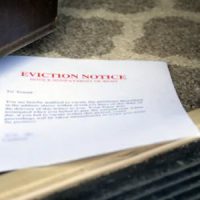Can I Be Evicted Because I Filed For Bankruptcy?

Many people struggle over the decision to file for bankruptcy and you are most certainly not alone if you are also struggling to understand all of the potential things that could happen as a result of you doing so. If you currently rent an apartment or house that you are hoping to continue renting for the foreseeable future, you are likely also wondering how your bankruptcy could affect this. Most importantly, you are probably wondering whether you can be kicked out for filing and this is a valid question. Can you in fact be evicted for filing for bankruptcy?
Background on Evictions in the United States
Eviction from rental housing is unfortunately prevalent in our country. According to the Eviction Lab at Princeton University, approximately 61 million eviction cases were filed in the United States between 2000 and 2016 alone. This equates to an average of 3.6 million evictions every single year. And unfortunately, more recent statistics indicate that the COVID-19 pandemic has only deepened America’s housing crisis. In just the six states and 31 cities that the Eviction Lab has been tracking during the pandemic, landlords have already filed for almost 450,000 evictions.
Can My Landlord Kick Me Out Because I Filed?
You most likely have a lot on your mind already if you have decided that filing for bankruptcy is the best option for your current situation. The last thing you need to deal with while you are already facing financial issues is the prospect of losing your home.
Fortunately, filing for bankruptcy does not mean you will face an automatic eviction even if you are behind on rent. Instead, whether or not you can be evicted depends on when on when you file for bankruptcy. More specifically, your landlord would have to have already obtained an eviction judgment before you finished filing for bankruptcy. Otherwise, you are protected under the automatic stay and the automatic rights under bankruptcy law against eviction that come with it unless certain other circumstances apply.
What Circumstances Can Override the Automatic Stay?
It is important to be aware that creditors may go before the court in a hearing and request that the stay be lifted – and that includes landlords. If the automatic stay is lifted by the court, then the landlord will be able to proceed with any eviction actions as originally planned.
In addition, recognize that if your landlord had already obtained an eviction judgment prior to when you filed for bankruptcy, he or she will not be bound by the automatic stay whatsoever. Further, an exemption to an automatic stay may occur if it is determined that the tenant seriously violated the lease terms or created a property hazard.
Do You Have Concerns About How Your Bankruptcy Would Affect Your Rental?
Once you have all the necessary information relevant to your individual situation put in understandable terms, the concept of bankruptcy probably won’t seem as daunting as you once thought. This is one of the best reasons to contact a knowledgeable bankruptcy lawyer who can help simplify things and ease your burden. As the Plantation bankruptcy attorneys at Nowack & Olson, PLLC, we are an experienced legal team you can look towards to discuss your best options for moving forward and getting out of debt. Set up your free consultation to go over your Florida bankruptcy today.
Resource:
aspeninstitute.org/blog-posts/the-covid-19-eviction-crisis-an-estimated-30-40-million-people-in-america-are-at-risk/#:~:text=Before%20the%20pandemic%2C%20eviction%20occurred%20frequently%20across%20the,In%202016%2C%20seven%20evictions%20were%20filed%20every%20minute
